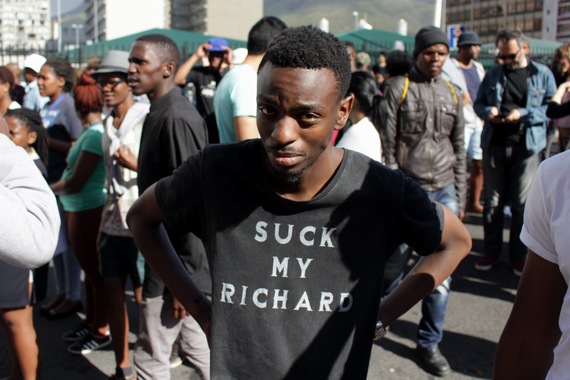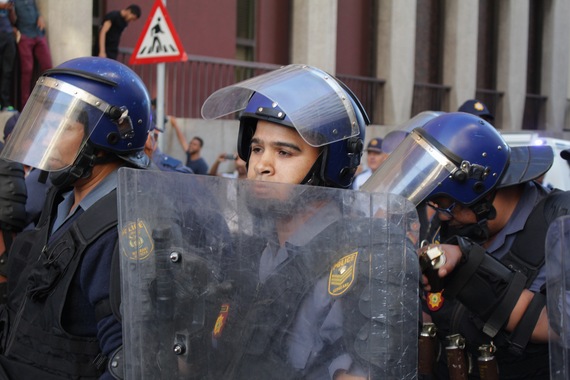 A protester outside Parliament in Cape Town. Image courtesy of Brendon Bosworth
A protester outside Parliament in Cape Town. Image courtesy of Brendon Bosworth
As soon as I enter the classroom, I can see my students are on edge. As refugees from Mali, Somalia, Congo (both sides of the river) and Libya, their experiences of xenophobia in South Africa have primed them to be afraid of big groups of vociferous South Africans. I assure them that everything is OK and they have nothing to worry about, but as I talk they continue to be distracted by the noise outside Parliament, which is just a stone's throw from our classroom.
Intermittently there are loud bangs from stun grenades and then screams and feet on tarmac as the crowds of students run down the street beside us. Each time the bangs stop they laugh at and to each other and then swell back towards Parliament like a tide.
It's a struggle to stick out the duration of the lesson. I keep having to stop myself from looking out of the window. I want to join the people outside, but the people inside the classroom must take priority for now.
When another bang goes up, Junior, a Congolese student, asks me what the protests are about. He asks if the protesters are Congolese. There are much more violent protests happening in his country as we speak, and he has been wincing and closing his eyes at each bang from outside our classroom.
"The wind has suddenly whipped up out of nowhere and it literally howls through the streets, as if it's also eager not to be left out."
For a moment, I pause and think how to concisely package the issue for him.
"They are protesting because of enduring inequality, because they believe that every South African should have an equal right to education, and that education should be free. They are also protesting because the police, the universities and the state are treating them as if they are violent and dangerous, and as if their demands and rights are not worthy of respect".
As I say these words, everything else falls away. All the conflicting crap that's been put about by certain corners of the media; all the doubts that have been raised about the way in which the protests have been carried out; all the divisive racialization of the debate; any lingering feeling that these students are nothing more than overexcited, privileged youngsters who have deemed themselves worthy to speak on everyone else's behalf and at least some of whom are motivated by nothing more than "fear of missing out".
Suddenly, I see that none of this really matters, and I can no longer find any excuse not to be there amongst the protesters, whatever my differences, whatever my own nationality, whatever my colour. I tell my class that I will be going to join the protesters after the lesson is finished and that they are welcome to join me if they like.
At 4.30pm six of us walk out of the door and head towards Parliament. The wind has suddenly whipped up out of nowhere and it literally howls through the streets, as if it's also eager not to be left out.
 Riot police outside Parliament in Cape Town. Image courtesy of Brendon Bosworth
Riot police outside Parliament in Cape Town. Image courtesy of Brendon Bosworth
The mood is calm -- many of the protesters are sitting on the street in small groups as if they were having a picnic in Kirstenbosch Gardens. Some have their necks craned over textbooks. Meanwhile, a long line of riot police in heavy gear cover the gates of Parliament. Someone has scrawled "free education" across the monument of Louis Botha, the first Prime Minister of the former Union of South Africa.
I wander around and talk to various different students to find out what's been happening, how long they've been there, and what they think about the whole thing. All the while, the excessive police presence makes me feel slightly uncomfortable, though when I look at some of their faces I think I'm a lot less uncomfortable than they are. I wonder what they think about it all, what they will go home and tell their loved ones at the end of what will no doubt have been a very long day.
I also wonder what I'll tell my family back in England next time I speak to them. How will I try to describe the strange feeling that on this day history was shouting and pulsating and taking shape all around me, that I was a part of history, that all of us there were; that things were giving way, breaking down, boiling over at the same time as they were being made and new foundations laid? Right there. Would they ever have experienced anything like that? I know I never had before I came here.
The crowd begins moving down Plein Street towards the side entrance of Parliament but is stopped by a solid wall of riot police, who then start pushing the crowd backwards. As we retreat, someone throws a water bottle but it falls short of the wall. Someone else throws a rock that a black female police officer dodges narrowly. She looks scared. Other protesters are shouting "Please guys don't throw things". As some protesters begin to run someone shouts "Don't run. Stay together. United we stand divided we fall."
"How will I try to describe the strange feeling that on this day history was shouting and pulsating and taking shape all around me; that I was a part of history, that all of us there were; that things were giving way, breaking down, boiling over at the same time as they were being made, as new foundations were being laid."
Soon the crowd has been pushed back to Buitenkant Street and more and more "Hippos" and police cars fill in the gaps behind the riot police. Each new batch of officers that pour out of the vehicles seem to look more and more ridiculously over-armoured.
An old man with long grey hair and beard strolls past the wall of police officers with his three legged dog as if he hasn't a care in the world. A photographer who wasn't quick enough on the draw stops him and asks if he'll go back to the start and then walk past again so he can get his shot.
I suddenly realize I've completely lost track of my students. I look around for them for a few minutes and eventually find them in the middle of a small group of black protesters, Toyi-toying and chanting with plenty of vigour, if slightly imperfect execution. I'm fairly sure they have no idea what most of the words they are trying to mimic mean, but they look happy just to be a part of it -- to be a part of something in this country that has so often been so unwelcoming to them.
And I'm a part of it too. I remember that this is what I wanted when I first left the UK and moved here. To be part of the change, to be part of history being undone and refashioned. To feel something I'd never felt in England. It has been building for some time now, though I'll admit I might have lost sight of it at times. But there is no denying its presence now.
Sooner or later, everything must fall.
This post was originally published on www.cawclark.com
